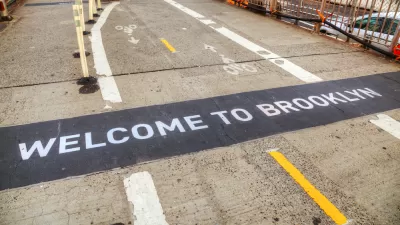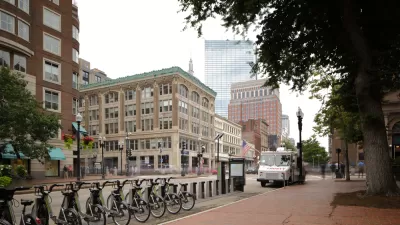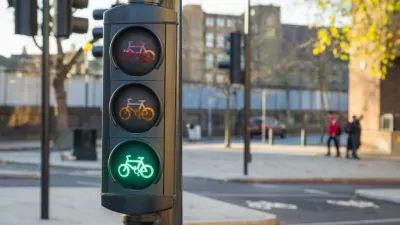The Christian Science Monitor argues why the growing popularity of bike-sharing programs across America will result in more cohesive communities and more livable places.
American cities are growing weary of their cars, and are yearning to slow down and spend more time in their local communities than behind the wheel. In a push to get people out of their sedans and into the streets, more cities are expanding bicycle infrastructure and implementing bike-share programs - "the newest form of public transit in the United States since the first subways were built more than a century ago."
Bike-sharing is becoming a reality in major cities across the country, like Los Angeles, Chicago, and New York, whose program "will be the largest outside Europe and China."
The Monitor's editors argue that, "Cities that are more bikable (and also walkable) allow for more personal interactions and better social cohesion than the car culture embraced in the 20th century. Bikes bring a slower, more intimate pace of life that can infuse more vitality into a city."
However, creating an urban bike culture, writes The Christian Science Monitor, requires more than just a bicycle and a willing rider. Cultivating a sense of respect between cyclists and drivers can be a challenging task, as "bicycling evangelists often create friction in their demands for more access. And car owners are reluctant to give up space to bike lanes, which are a necessity for bike safety." But with more cyclists comes enhanced safety, the article notes.
Cars are here to stay, but bike-sharing is proving to be a one-way ticket to friendlier communities.
FULL STORY: Why bike sharing will make cities friendlier

Maui's Vacation Rental Debate Turns Ugly
Verbal attacks, misinformation campaigns and fistfights plague a high-stakes debate to convert thousands of vacation rentals into long-term housing.

Planetizen Federal Action Tracker
A weekly monitor of how Trump’s orders and actions are impacting planners and planning in America.

In Urban Planning, AI Prompting Could be the New Design Thinking
Creativity has long been key to great urban design. What if we see AI as our new creative partner?

King County Supportive Housing Program Offers Hope for Unhoused Residents
The county is taking a ‘Housing First’ approach that prioritizes getting people into housing, then offering wraparound supportive services.

Researchers Use AI to Get Clearer Picture of US Housing
Analysts are using artificial intelligence to supercharge their research by allowing them to comb through data faster. Though these AI tools can be error prone, they save time and housing researchers are optimistic about the future.

Making Shared Micromobility More Inclusive
Cities and shared mobility system operators can do more to include people with disabilities in planning and operations, per a new report.
Urban Design for Planners 1: Software Tools
This six-course series explores essential urban design concepts using open source software and equips planners with the tools they need to participate fully in the urban design process.
Planning for Universal Design
Learn the tools for implementing Universal Design in planning regulations.
planning NEXT
Appalachian Highlands Housing Partners
Mpact (founded as Rail~Volution)
City of Camden Redevelopment Agency
City of Astoria
City of Portland
City of Laramie





























